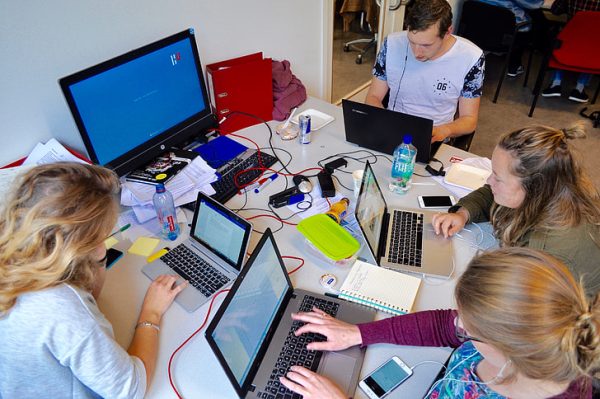 Throughout the ages, students have found ways of getting information stuck in their brains. As the world becomes more techy, so has the way students look for brain-nourishing information. They are turning in their books for cool screens instead, but does one measly feeble screen substitute for all the school books as well as being considered more reliable than the pages?
Throughout the ages, students have found ways of getting information stuck in their brains. As the world becomes more techy, so has the way students look for brain-nourishing information. They are turning in their books for cool screens instead, but does one measly feeble screen substitute for all the school books as well as being considered more reliable than the pages?
The computer option allows students to have the slightest bit of relief off their shoulders with less weight to hold during the transactions of different classes. However, the reliability of the sources on the computer isn’t always guaranteed to be truthful.
We teach our children from a young age to recite the letters that form words. The more famously known technique is in the form of reading picture books to them to encourage the activations in the children’s brains to help them grasp the language around them. The website “government technology” discusses the topic of books vs. screens. They mention a study in which researchers found that three and four-year-old children had more activations in their brains in the language regions when reading a book by an adult or an audiobook, but when the children are given a screen to read from the same activators for language, it goes to an all-time low. In another 2020 study done on 8 to 12-year-olds, they compared MRI scans to kids who spent their time reading a paper book to those who spent their time reading on the screens. Interestingly they found that the kids who spent more time reading the paper pages their reading circuits were significantly stronger than those who put up the books in favor of screens.
Another Study done by the Reboot Foundation Evaluated thousands of students across 90 countries including the U.S. In the studies, he found that 4th graders who used screens in almost all their classes scored 14 points lower on a reading test than students who never used screens.
 Researchers have named this score gap “equivalent to a full grade level.” The research shows that students who used the screen instead of books every day for several hours during class time underperformed the most. While on the other hand, the gap seemed to shrink or even disappear when students spent less than half an hour a day on a screen.
Researchers have named this score gap “equivalent to a full grade level.” The research shows that students who used the screen instead of books every day for several hours during class time underperformed the most. While on the other hand, the gap seemed to shrink or even disappear when students spent less than half an hour a day on a screen.
Researchers don’t know why it seems like students understand the words better when written on a piece of paper more than on the screen. Except for one researcher who claims to know the reasoning behind the question, most researchers are stumped. It’s simply the issue of distraction, says Julie Coiro, a researcher from the University of Rhode Island. The links and videos that could all be attached to the reading material often drag students’ attention away from the material on the screen.
Now some techies would argue that the web has a lot more information at one’s fingertips than you could find on the shelves. While it may be true that the web has a lot more than a single book, the reliability of the web could put a damper on the opinions of students.
Unfortunately, there isn’t much one can do to get rid of biased articles other than making sure to go to a reliable source for information. Click on reliable websites and links instead of sketchy websites that may try to steal your and your grandmother’s personal information.
A high percentage of students self-report learning better by a physical book more than through a screen, contrary to how they’re being taught in today’s age as we as a society stray further and further from the paper pages our great grandparents and their parents before them they loved so much with each passing day.

